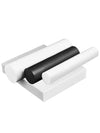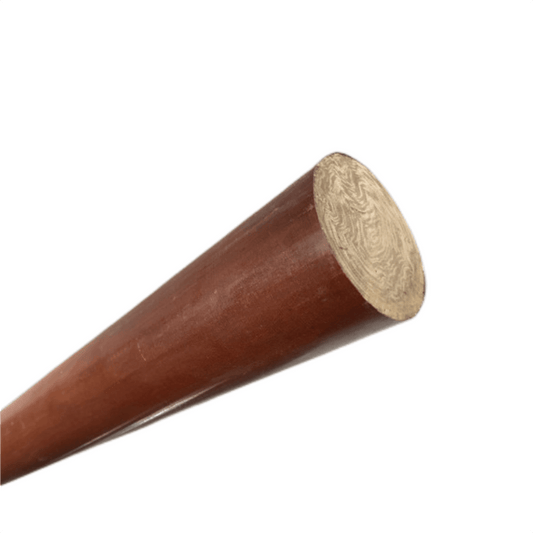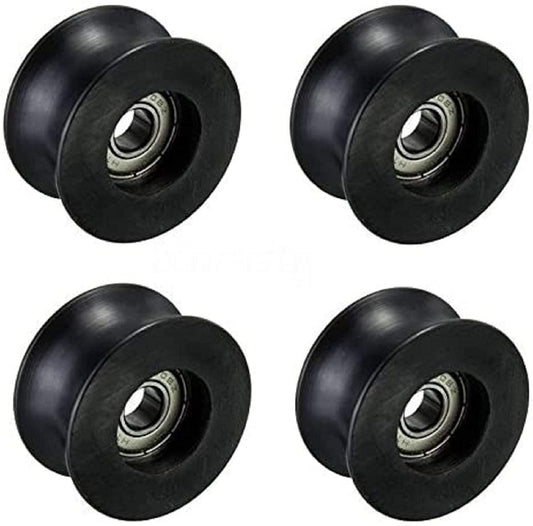Introduction
Ultra High Molecular Weight (UHMW) polyethylene sheets, with their extremely long polymer chains and high molecular weight, possess a unique combination of properties including high durability, low friction coefficient, high abrasion and chemical resistance, making them an ideal material for applications in demanding environments.
As robotics and automation continue advancing into unprecedented complexity, materials that can withstand intensive wear and friction are pivotal for constructing reliable, high-performance robotic systems. UHMW sheets in robotics have become indispensable across automated factories, processing plants, surgical centres and more. UHMW in advanced robotics marks an integration of high strength polymers for revolutionizing functionality.

UHMW Sheets in the World of Robotics
The Integration of UHMW in Robotic Engineering
Constructing robots capable of sophisticated movement control relies heavily on optimizing friction within mechanical systems. Robotic applications of UHMW sheets as bearing sleeves, gears and body panels grant smooth articulation under extreme loads.
For instance, the latest humanoid robots by Boston Dynamics incorporate UHMW hip joint bearings, improving stability for dynamic motions. Researchers also laminate UHMW films onto robotic grippers, enhancing grip and reducing surface damage for delicate objects. From prosthetic limbs to surgical manipulators, UHMW-lined interfaces are driving the frontier.
UHMW in robotic engineering marks a shift toward durable polymers for withstanding multidirectional stresses. Backed by computational analysis and field evidence, the integration of UHMW unlocks unprecedented robotic performance under demanding conditions.

UHMW in Modern Robotic Systems
Beyond foundations of mechanical design, UHMW sheets for robotic systems also upgrade performance through sensors, controllers and peripherals. Thin UHMW buffers in self-balancing transporters like Segway handle intense vibrations, maintaining positioning precision. Industrial pick-and-place arms utilize UHMW suction cups with vacuum sensors, enabling reliable lifting despite surface irregularities.
UHMW in modern robotics is also enabling miniaturization advances through microelectromechanical systems (MEMS) technology. As diminutive sensors and polymer actuators emerge, flexible and highly wear-resistant UHMW films have become the material substrate for microswarm construction. From intuitive collision detection to adaptive self-organization, UHMW-MEMS integration unlocks sophisticated capabilities.
UHMW and Its Impact on Automation
UHMW in Industrial Automation
Automated control now governs large-scale manufacturing, chemical processing and supply chains. Within such extensive interconnected systems, high-performance UHMW in automation reigns to counter extreme operational demands.
Machines with UHMW bearings withstand vast throughput of heavy payloads in smart factories. Food processing equipment lined with anti-static UHMW films maintains precise coordination despite caustic contaminants. Stepper systems across automated teller machines rely on UHMW belts and rollers for millions of high-friction cycles.
By bolstering reliability over prolonged intensive use, UHMW in industrial automation has become instrumental for increasing productivity and efficiency. Cost-benefit analyses confirm that integrating UHMW into robotic elements generates substantial long-term profits.

Innovative Automation Solutions with UHMW
Beyond conventional automation domains, UHMW also catapults cutting-edge technologies by tackling complex environments. Self-driving vehicles outfitted with UHMW bumpers, lidars and radomes push through rain, sleet and snow. Extreme terrain robotics with UHMW treads traverse radioactive, biologically hazardous sites.
Highly dynamic control further allows innovative UHMW applications, from morphing airplane wings that reshape aerodynamics mid-flight to omni-directional wheels enabling café table robots to navigate cramped spaces. By buffering extreme forces, UHMW assimilates movements once considered impossibly complex into robotic possibility.
Automation advancements with UHMW will continue opening possibilities. Exoskeletons granting superhuman strength and fractal sensor grids detecting pre-tremors promise extraordinary progress on horizons by synergizing polymers, electronics and automation.
The Future of UHMW in Robotics and Automation
UHMW in Next-Generation Robotics
As artificial intelligence merged with expanded robotic capabilities accelerates developing UHMW in next-gen robotics, expectations run high for machines exceeding human limitations. We may foresee bipedal robots with UHMW-woven muscle analogs that lift 2 tons in disaster rescue. Microsubmarine drones lined with anti-biofouling UHMW films may soon survey extreme underwater environments.
UHMW in sophisticated automation will also likely reinvent supply chains through omnivehicle fleets that self-coordinate complex logistics. Robots with UHMW touch receptors may even tend household duties or provide healthcare services. The integration of high-performance polymers and automation is set to reshape society.

UHMW and the Integration with High-Tech Systems
Beyond industrial contexts, UHMW also promises to elevate consumer technology experiences to greater intuitiveness. Haptic VR gloves containing flexible UHMW membranes paired with pressure sensors may enable realistic touch sensation across virtual environments. UHMW sheets in smart robotics will drive smoother home assistance from cleaning robots, alarm clocks with mobility to automated chef stations.
Even augmenting human bodies, UHMW promises integration with biomechatronic technology - from brain signal processors enabling paraplegics to control computer cursors to artificial organ scaffolds paving way for enhanced natural tissue regeneration. At the intersection of material science and biology, UHMW technology in robotics heralds an era of dissolving boundaries between bodies and machines.
Boasting exceptional durability, wear resistance and friction characteristics, UHMW in high-tech applications will remain pivotal in coming decades. As robotics and automation continue permeating our homes, workplaces and exploratory frontiers, UHMW promises to be a high-performance backbone reinforcing systemic reliability and versatility.
Overall, the multifaceted strengths of this polymer empowers constructing machines that overcome environments once unnavigable. With integration across industrial and consumer systems, UHMW and advanced robotic technology mark an ever-expanding realm of possibility in directly enhancing efficiency, safety, discovery potential and quality of services that automation delivers. We have only begun unlocking the hidden properties of materials that will propel future innovation bursts.
For engineers, researchers and technology executives exploring automation solutions, UHMW promises game-changing improvements in product performance. Please share your thoughts on how UHMW applications can address unique challenges in your field. Manufacturers may also contact us regarding custom UHMW fabrication. Let us continue discussing innovative uses of UHMW sheets that will push progress for all.
Exploring the Cutting-Edge: A Comprehensive FAQ on UHMW Sheets in Robotics and Automation
Q1: What are UHMW Sheets and Why are They Important in Robotics?
A1: UHMW (Ultra-High Molecular Weight Polyethylene) sheets are a type of plastic known for their high durability, low friction, and resistance to wear and tear. In robotics, these properties make UHMW sheets ideal for parts that require strength, low friction, and longevity, such as gears, bearings, and sliding surfaces.
Q2: How are UHMW Sheets Used in Robotic Engineering?
A2: In robotic engineering, UHMW sheets are often used to create components that need to withstand repetitive motion and stress, such as joints, gears, and sliding guides. Their low friction coefficient and high wear resistance make them perfect for these applications.
Q3: Can UHMW Sheets Improve the Performance of Robotic Systems?
A3: Yes, UHMW sheets can significantly improve the performance of robotic systems. Their durability and low friction reduce the need for frequent maintenance and replacement of parts, leading to more efficient and reliable robotic operations.
Q4: What Role Do UHMW Sheets Play in Industrial Automation?
A4: In industrial automation, UHMW sheets are used to manufacture components that require high strength and low friction, such as conveyor belts, guide rails, and rollers. This helps in reducing downtime and increasing the efficiency of automated systems.
Q5: Are There Innovative Applications of UHMW in Complex Automated Systems?
A5: Yes, UHMW is being innovatively used in complex automated systems, such as in precision parts in high-speed machinery, in packaging and sorting systems, and in advanced manufacturing processes where durability and precision are crucial.
Q6: What is the Future Potential of UHMW in Robotics and Automation?
A6: The future potential of UHMW in robotics and automation is vast. As technology advances, UHMW could be used in more sophisticated applications, such as in the development of smart robotic systems that require materials with high durability and flexibility.
Q7: How Does UHMW Contribute to the Development of Smart Robotics?
A7: UHMW contributes to the development of smart robotics by providing a material that can withstand the demanding environments of advanced robotic systems. Its durability and resistance to wear and tear make it suitable for smart robots that require long-lasting, reliable components.
Q8: Are UHMW Sheets Environmentally Friendly?
A8: UHMW sheets are considered environmentally friendly due to their long lifespan and recyclability. Their durability means they don't need to be replaced often, reducing waste, and they can be recycled at the end of their life cycle.
Q9: What Challenges are Faced When Integrating UHMW in Robotic Systems?
A9: The main challenges include ensuring precise machining of UHMW for specific parts, adapting designs to leverage UHMW's unique properties, and integrating these components seamlessly into existing robotic systems.
Q10: Can UHMW Sheets be Customized for Specific Robotic Applications?
A10: Yes, UHMW sheets can be customized in terms of size, thickness, and even added properties like UV resistance or anti-static features to meet specific requirements in robotic applications.







